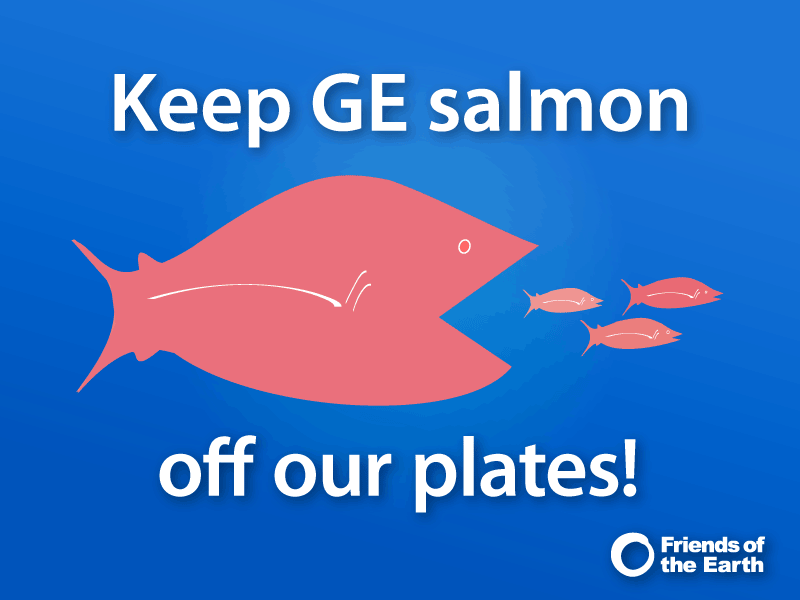
Genetically engineered salmon one step away from approval take action now!
Right before the holidays, while most of us were spending time with our families and friends, the Food and Drug Administration was busy giving the biotechnology industry a big, fat, genetically engineered gift. On December 21, the FDA quietly released its long-awaited draft Environmental Assessment on genetically engineered salmon — the last step before it can approve GE salmon for human consumption. This fish, which has been genetically engineered to grow twice as fast as other farmed salmon, would be the first-ever GE animal that could end up on our dinner plates.
The FDA is nearing its final approval of GE salmon despite the fact that poll after poll shows that the public doesn’t want to eat genetically engineered fish or other animals. To make matters worse, the GE salmon will most likely not be labeled—making it difficult for people to avoid when shopping or dining out. The approval of GE salmon will also open the floodgates for other genetically engineered animals, including pigs and cows, to enter the food supply.
Friends of the Earth, along with our allies, has called on the FDA to complete an Environmental Impact Statement – a much more thorough review of risks than a shorter Environmental Assessment, which was just released. An EIS would look at the environmental impacts of full-scale commercialization of GE salmon, for example, and would also look at the economic impacts posed to fishermen and fishing communities around the country. We are confident that once the FDA has done its due diligence, it will have no choice but to deny approval of GE salmon.
FDA’s assessment is fatally flawed and fails to take into account the very real risk that these fish pose to endangered wild salmon, the environment, public healthand our fishing communities on both coasts. The Environmental Assessment fails to:
- Take into account the impacts full-scale commercialization of GE fish will pose to the environment. AquaBounty, the developer of GE salmon, admits it has plans to raise GE salmon around the world, yet the FDA has intentionally limited the scope of its review to the company’s initial stage of production in Canada and Panama.
- Fully asses the risks GE fish pose to the environment if they were to escape confinement. According to the assistant regional director for fisheries for the Fish & Wildlife Service’s Northeast region, James Geiger, “Although AquaBounty claims their fish are sterile, that sterilization process is not 100 percent. There is the possibility that some of these fish could escape and reproductively interact with wild native salmon…Any potential offspring could reduce the biological and ecological fitness of the native wild salmon…any potential escape, no matter how little,” Geiger states, has the potential to harm endangered wild salmon populations. The FDA on the other hand, assumes no fish will escape so there is no risk despite the fact that upwards of 5% of the fish may be fertile and can mate with wild salmon populations.
- Look at the risk of spreading disease to wild salmon populations. The EA concludes that GE salmon are no more susceptible to disease than other farmed salmon but then assumes that the GE fish will not transmit any disease to wild fish. We have learned from conventional salmon farming that these fish regularly spread viruses and parasites to wild fish populations. Even more troubling is the fact that AquaBounty had a case of the deadly Infectious Salmon Anemia virus, a fact that was not mentioned at the FDA’s public hearing in 2010. This EA fails to look at where the virus came from and does not discuss any plans to prevent ISA from infecting these facilities again in the future.
Take action now!
The FDA is accepting comments until February 25. We need your help to tell the FDA to no to this risky “Frankenfish”.
Related Posts
Ways to Support Our Work

Read Latest News
Stay informed and inspired. Read our latest press releases to see how we’re making a difference for the planet.

See Our Impact
See the real wins your support made possible. Read about the campaign wins we’ve fought for and won together.

Donate Today
Help power change. It takes support from environmental champions like you to build a more healthy and just world.